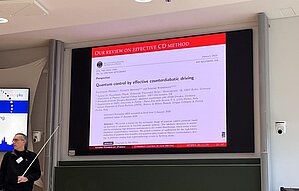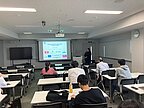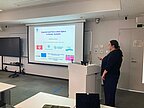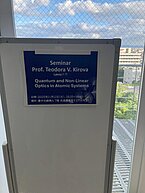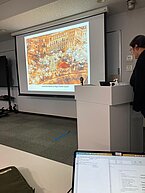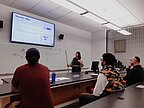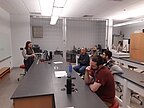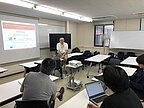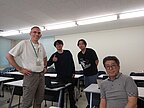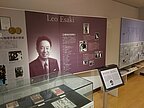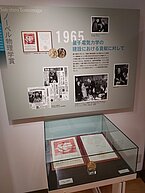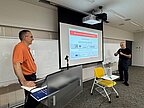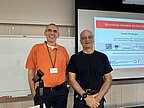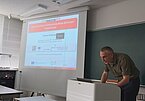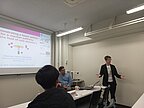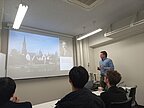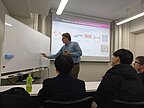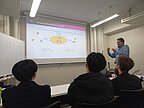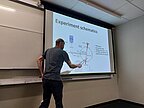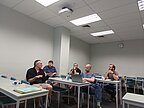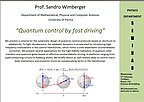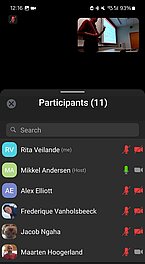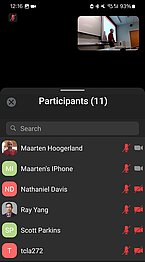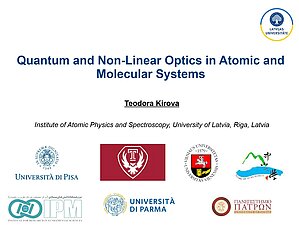Lecture on atomic absorption spectroscopy methods for environmental monitoring
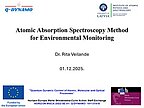
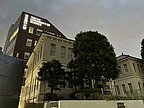
On 1 December 2025, while seconded to the Tokyo University of Science, Rita Veilande, a leading researcher from the University of Latvia, delivered a lecture to university students on another research direction pursued at the Institute of Atomic Physics and Spectroscopy — the use of spectroscopic methods to detect heavy metals in the environment and the importance of monitoring them.
She presented practical applications of Zeeman atomic absorption spectroscopy, illustrating how mercury concentrations can be measured in various types of environmental samples.
International Workshop on Atomic Physics, 24-28 November 2025
The leader of the Parma group Prof. Sandro M. Wimberger contributed an invited plenary talk on "Coherent Control by Fast Driving" during the International Workshop on Atomic Physics, 24-28 November 2025, MPIPKS, Dresden, Germany, with an explicit mentioning of the Q-DYNAMO project
Seminar on Quantum and Nonlinear Optics in Atomic Systems
On 11th November 2025 while seconded to the University of Electro-Communications, the project coordinator Dr. Teodora V. Kirova was invited to present a seminar "Quantum and Nonlinear Optics in Atomic Systems" at the Center for Quantum Information and Quantum Biology (QIQB), University of Osaka. She also paid a visit to various labs including "Quantum Computing" and "Quantum Information Device" ones, where she familiarized herself with the third superconducting quantum computer in Japan, as well as the experimental setups for ultracold neutral atom trapping, ion trapping, and optical tweezer arrays.
Abstract: In the first part of the seminar will be devoted to reversing adiabatic state preparation in an effective three-level quantum system consisting of singlet and triplet states. We show that transfer of population between an initial and a final triplet state can be achieved with high speed and fidelity by adding a counterdiabatic quantum control protocol. As a second step, we invert the preparation protocol to get back to the initial state, thus achieving overall cyclic evolution in state space. The protocols are relevant for applications in quantum optics and quantum technologies, such as transfer between singlet and triplet populations in the process of cold molecule formation, or the implementation and improvement of an all-optical spin switch.
Next, we will focus on Rydberg-Rydberg interaction strengths and dipole blockade radii in the presence of Förster resonances. When the initial principle quantum numbers of the two Rydberg atoms differ by a value greater than 10, we observed that the Förster defect approaches zero in numerous cases, leading to a large Rydberg-Rydberg interaction. In some transition channels, we achieved giant blockade radius of 53 µm, which exceeds twice the currently largest experimental measurement
Seminar at Ulm University
While on his secondment to Ulm University the leader of Auckland team Prof. Scott Parkins presented the current research topic "Nonclassical light-getting more out of a single atom" on 27.10.2025.
Abstract: In this talk I present some novel proposals for the generation of nonclassical light in single-atom cavity QED that are offered by the intrinsic multilevel structure of a real atom. This includes a deterministic source of N-photon pulses, as well as continuous sources of Wigner-negative light and quadrature-squeezed light.
Seminar at Temple University
Secondees from Institute of Atomic Physics and Spectroscopy, University of Latvia presented their research at Temple University on 23 October 2025:
- Dr. Gita Rēvalde, Leading researcher - Photonics for Fundamental Research, the Environment and Health,
- Dr. Anda Ābola, Researcher - Mercury and Arsenic High-Frequency Electrodeless Discharge Light Sources for Zeeman Atomic Absorption Spectroscopy.
G. Rēvalde gave an overview of the laboratory’s research in photonics and spectroscopy, including studies on ion spectroscopy and CRDS, as well as experience in developing sensors and sensor systems, methods for the preparation and diagnostics of low-temperature plasma light sources for various applications, including quantum standards.
A. Ābola’s presentation was focused on the research of mercury and arsenic containing high-frequency electrodeless discharge lamps, for their practical application in Zeeman atomic absorption spectroscopy, as well as plasma diagnostics. Several examples from mercury concentration measurements in various media will be shown
Seminar on Nonlinear Dynamics of Coupled Light-Matter
On 1.10.2025 a PhD student from University of Auckland Ofri Adiv presented his current research topic 'Nonlinear Dynamics of Coupled Light-Matter' during a seminar at University of Parma
Seminar on Demonstrating beam splitters for reaction pathways in the field of cold chemistry
While on a secondment to University of Michigan the leader of the Ulm team Prof. Johannes H. Denschlag presented his current research topic ' Demonstrating beam splitters for reaction pathways in the field of cold chemistry' on 02.09.2025.
Abstract: Our group studies chemical reactions of ultracold Rb atoms in a state-to-state resolved fashion, where we prepare reactants in well-defined quantum states and measure the quantum states of the molecular products. In particular, we focus on three-body recombination where three atoms collide, forming a diatomic molecule. The third atom carries away part of the binding energy. We are currently investigating methods to gain control over this chemical reaction. By making use of either a magnetically tunable Feshbach resonance or an avoided crossing of molecular levels we can effectively construct different kinds of beam splitters for the reaction pathways. The idea is to resonantly admix at specific points of the reaction coordinate additional quantum states to the original collision complex. This opens up an additional pathway that the reaction can take. By tuning the magnetic field in our experiments, we can control these beam splitters and can redirect a sizeable fraction of the reaction flux between different product channels. These beam splitters are fully coherent, and, in the future, it should be possible to use them also in interferometric schemes for controlling the reaction
Seminar at Temple University
On 25.08.2025, while seconded to Temple University, the leader of the Ulm team Prof. Johannes Hecker Denschlag presented a talk ‘Demonstrating beam splitters for reaction pathways in the field of cold chemistry’.
Abstract: Our group studies chemical reactions of ultracold Rb atoms in a state-to-state resolved fashion, where we prepare reactants in well-defined quantum states and measure the quantum states of the molecular products. In particular, we focus on three-body recombination where three atoms collide, forming a diatomic molecule. The third atom carries away part of the binding energy. We are currently investigating methods to gain control over this chemical reaction. By making use of either a magnetically tuneable Feshbach resonance or an avoided crossing of molecular levels we can effectively construct different kinds of beam splitters for the reaction pathways. The idea is to resonantly admix at specific points of the reaction coordinate additional quantum states to the original collision complex. This opens up an additional pathway that the reaction can take. By tuning the magnetic field in our experiments, we can control these beam splitters and can redirect a sizeable fraction of the reaction flux between different product channels. These beam splitters are fully coherent, and, in the future, it should be possible to use them also in interferometric schemes for controlling the reaction.
Seminar on Quantum control by fast driving
On 22.07.2025, while seconded to UULM, Prof. S. Wimberger gave a lecture to the Institute for Quantum Matter members, presenting his current research topic at PR ‘Coherent Control by Fast Driving’
Workshop on Quantum Walks with Spinor Bose-Einstein Condensate
Prof. Sandro Wimberger visited Prof. Yutaka Shikano's group at University of Tsukuba, Japan on 04.06.2025, where he presented another research direction of the Parma team 'Quantum Walks with Spinor Bose-Einstein Condensate’. In addition, he had extended discussions on this topic with the interested students from the audience.
Abstract. Quantum randomness is intrinsically different from classical stochasticity since it is affected by interference and entanglement. Both make quantum walks promising candidates for the implementation of quantum computational algorithms and as a sensitive detector of interference. We present a discrete-time quantum walk that uses the momentum of ultra-cold rubidium atoms as the walk space and two internal atomic states as the "coin" degree of freedom. We demonstrate the distinctive features of a quantum walk, contrasting them to a classical walk. By manipulating either the walk or coin operator we show how the walk dynamics can be biased and even reversed. Our quantum walk provides a platform for a wide range of applications such as quantum search, the investigation of decoherence, and the observation of topological phases.
Workshop on Solving the Schrödinger-Poisson Equation as a Model for Cold Dark Matter
While on his secondment, on 19.05.2025 Prof. Sandro Wimberger presented one of the current research topics of the Parma group "Solving the Schrödinger-Poisson Equation as a Model for Cold Dark Matter" to around 30 department members of the Tokyo University of Science.
Abstract: We compare two different numerical methods to integrate in time spatially delocalized initial distributions of fuzzy dark matter. The basic equation is a nonlinear Schrödinger equation with an auto-gravitating potential created by the wave function density itself. The latter is determined as a solution of Poisson's equation modelling non-relativistic gravity. Both of our methods, a Strang splitting scheme and a basis function approach using B-splines, are compared in numerical convergence and effectivity. Overall, our Strang-splitting evolution compares favourably with the B-spline method. By using an adaptive time-stepper large one-dimensional boxes can be treated. We understand and can control the unusual relaxation process occurring in one dimension due to the scale-free long-range interaction. These results give hope for extensions to two spatial dimensions for not too small boxes and large evolution times necessary for describing realistic dark matter formation over cosmologically relevant scales.
Visit to Prof. Franco Nori's group at RIKEN Japan
While on a secondment to Tokyo University of Science, the leader of the Parma team Prof. Sandro Wimberger, visited Prof. Franco Nori's group at RIKEN Japan, where he presented his current research topic 'Quantum control by fast driving' on 15.05.2025.
Abstract: The speaker presented a scheme for the systematic design of quantum control protocols based on shortcuts to adiabaticity. To fight decoherence, the adiabatic dynamics is accelerated by introducing high-frequency modulations in the control Hamiltonian, which mimic a time-dependent counterdiabatic correction. Also, several applications were presented for the high-fidelity realisation of quantum state transfers and quantum gates based on effective counterdiabatic driving, The related ideas to control many-body interactions and evolution errors by compensating terms in the Hamiltonian were sketched.
Summer school = Q-DYNAMO Workshop on Quantum Optics
The 3rd Q-DYNAMO Workshop = Summer School on Quantum Optics was organised at Tokyo University of Science (TUS) campus on 12.05.2025 by the leader of the Parma team Prof. Sandro Wimberger (currently on a secondment to Tokyo) and the host Prof. Mark Sadgrove.
The workshop started with two specially invited lectures by Prof. Akira Shudo (Tokyo Metropolitan University) ‘Quantum phenomena in mixed phase space: indispensable roles of complex-domain classical dynamics’ and Prof. Yasutaka Hanada (Showa University) ‘Dynamical Tunneling in the Suris's integrable map’.
In the second part of the workshop the two organizers presented the current research topics in their groups, followed by open discussions especially targeted at graduate students’ involvement. In total around 10 members of Q-DYNAMO teams, including Tokyo and Riga, attended the seminar in person or online.
Seminar on Beam splitter for a reaction pathway in the field of cold chemistry
During his secondment to Tokyo University of Science Prof. Johannes Denschlag gave a seminar on 05.03.2025, presenting a hot research topic from the Ulm team "Demonstrating a beam splitter for a reaction pathway in the field of cold chemistry." The event was attended by members of the TUS team, including other interested faculty, as well as the project coordinator Dr. T. Kirova who is currently on a secondment to the University of Electro-Communications
Summer school = Q-DYNAMO Workshop on Quantum Control
To kick-off the International Year of Quantum Science and Technology (IYQ2025), the ‘2nd Q-DYNAMO Workshop on Quantum Control’ was organised on 11.02.2025 at the University of Otago. Two talks on their current research directions were given by the leader of Otago team Prof. Mikkel Andersen, as well as Dr. Rita Veilande from University of Latvia (seconded to Dunedin). Special presentation was given by PhD student Robers Weiß (visiting from Heidelberg University) with the aim to encourage student participation. The workshop was targeted at graduate students audience and therefore organised in a ‘summer school format’ on-site and online. The leader of the Parma team Prof. Sandro Wimberger, who was also visiting the Otago team within the Q-DYNAMO collaboration, concluded the workshop with extensive discussions on modern theoretical and experimental topics.
Seminar on Quantum control by fast driving
Prof. Sandro Wimberger, leader of the Parma team, currently completing his secondment to the Atomic Physics Laboratory at University of Otago, presented his research topic ‘Quantum control by fast driving’ on 05.02.2025. Members of New Zealand teams attended the seminar in person, while 11 international researchers from Latvia and Germany participated online
Department Seminar on Two Different Solving the Schrödinger-Poisson Equation as a Model for Cold Dark Matter
While on his secondment in New Zealand, on 24.01.2025 Prof. S. Wimberger presented one of the current research topics of the Pisa group ‘Two Different Methods for Solving the Schrödinger-Poisson Equation as a Model for Cold Dark Matter’ to around 30 department members of the University of Auckland. The seminar produced interesting discussions with several groups at Auckland
Summer school = Q-DYNAMO Workshop on Quantum Optics

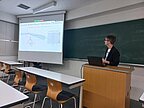
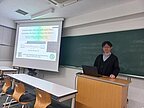
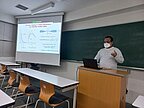
The end of the first year of the project was commemorated by the "1st Q-DYNAMO Workshop on Quantum Optics" organised on 09.12.2024 by Prof. Mark Sadgrove at Tokyo University of Science (TUS). The Q-DYNAMO leaders from Japan Prof. Mark Sadgrove and Prof. Kali Nayak, as well as the project coordinator Dr. Teodora Kirova (seconded to TUS) presented the current research topics of each team. A special invited lecture was read by Prof. Kaoru Sanaka from TUS. The event was organised in a "summer school format" both with on-site and online participants with extensive time after the lectures, particularly dedicated for open discussions. It was targeted especially at graduate students to encourage them to participate in debates about various scientific topics, theoretical and experimental methods. Members of Q-DYNAMO teams from Tokyo, Ulm and Riga also attended the seminar in person or online. Around 10 people were present on-site, while majority of interested online participants (around 10) were from different research groups at University of Latvia
Q-DYNAMO Graduate student seminar on quantum optics


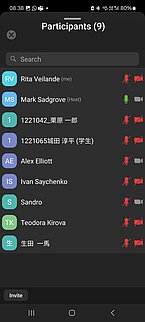
Q-DYNAMO Graduate student seminar on quantum optics Ivan Saychenko, a PhD student from University of Parma who is currently completing his 2.5 months secondment to Dr.Mark Sadgrove's group at Tokyo University of Science, presented his research topic "Numerical methods for evolving non linear Schrödinger equations" at a "Graduate student seminar on quantum optics" on 31.10.2024. The target group of the seminar was other graduate students, with the aim of encourage extensive discussions about the presented topics and the used scientific methods. Members of Q-DYNAMO teams from Tokyo, Parma, Pisa and Riga also attended the seminar in person or online
Temple University Physics Colloquium
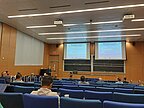
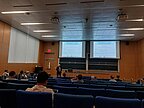
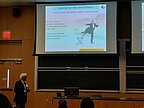
Participants of the Q-DYNAMO project on 23.09.2024 attend the Temple University Physics Colloquium onganised by the Molecular Quantum Optics Group of Prof. A. Marjatta Lyyra.
Special talk was given by Prof. Ennio Arimondo from University of Pisa on "Superadiabatic control of quantum systems".
Other attendees included well known researchers in quantum optics and atomic and molecular physics from Lehigh University, as well as the National Institute of Standarts and Technology.
Rita Veilande from the Riga group, who is currently completing her 2-month secondment to Temple University, also attended the seminar
Seminar at University of Colorado
During his secondment to University of Colorado, on 16.08.2024, Prof. Johannes Hecker Denschlag presented a seminar ‘Demonstrating beam splitters for reaction pathways in the field of cold chemistry’
Seminar on Quantum and Nonlinear Optics in Atomic and Molecular Systems
While seconded to Ulm in March 2024, the Q-DYNAMO coordinator Dr. T. Kirova presented to the Institute for Quantum Matter staff her current research topic ‘Quantum and Nonlinear Optics in Atomic and Molecular Systems’. The lecture covered three separate research directions on ‘Azimuthal Dependence of Electromagnetically Induced Grating in a Double V-type Atomic System near Plasmonic Nanostructure’, ‘Dipole-Dipole Interaction Strength and Dipole Blockade Radius using Förster resonances in Rb atoms’, as well as ‘High-fidelity quantum control via Autler-Townes splitting’. Discussions with the participants were held and common research interests were found, especially in the realm of Rydberg physics and Autler-Townes effect for controlling ultracold chemical reactions

 LU konference
LU konference